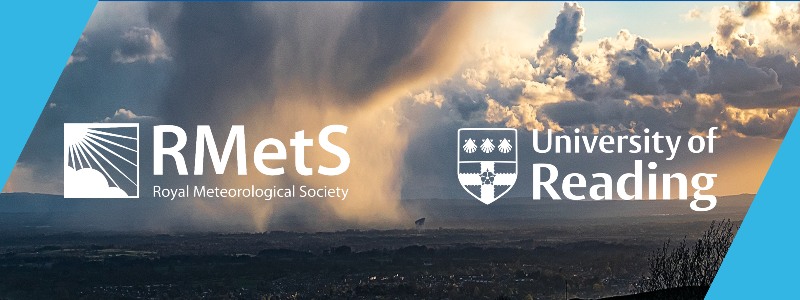

CPD WEBINAR | Representing convection in Numerical Weather Prediction models and its implications
LOCATION
UPDATE | Registration has now closed for this Masterclass.
TITLE | Representing convection in Numerical Weather Prediction models and its implications
SPEAKER | Prof. Bob Plant, Professor of Meteorology, University of Reading
This CPD webinar is a part of a Masterclass Series, held in joint partnership with the University of Reading. You can choose to attend just this event. Attendance at all three is not compulsory.
This year the Masterclass Series is a charged-for event, therefore, please ensure you choose the correct registration fee when registering.
The forecasting of convective precipitation remains among the most challenging and most stubborn problems in meteorology. In this talk, we review the fundamental scientific challenges, discuss recent progress and advances being made in this field, and highlight some of the implications for operational forecasting. Climate models and global-scale numerical weather prediction treat convection through a parameterization and we describe some of the key ideas and recent and ongoing improvements with this approach. The diurnal cycle, for example, has been much improved in many models. As computational resources have increased, an important development over recent years has been the increased use of high-resolution simulations that do not require the use of a convective parameterization. These have become common for short-range forecasting and their outputs typically present us with a picture that is rich in detail. Although the high resolution brings benefits, we do need to ask how realistic are the details and how far should we rely upon them.
Bob took his undergraduate degree in Physics at Oxford and did a PhD in particle physics at Manchester. He then worked for British Nuclear Fuels, making risk assessments of the long-term evolution of disposal sites for low-level radioactive waste. He finally saw the meteorological light during a postdoctoral position at Queen Mary College in London, researching into anomalous radar propagation. This led him to a second postdoctoral position on extratropical storms in Reading in 2001. Since then he has stayed put, developing various research interests in convective storms and boundary layer meteorology, especially in developing new approaches for modelling these phenomena and assessing the model results. He has made his way through the ranks to become a professor in atmospheric convection and joint head of the Meteorology department.
Non-member: £25.00
Member: £20.00
Corporate Partner: £20.00
Accredited Member: £15.00
Student: £15.00
Retired: £15.00
Please see below the last CPD Webinar within this Masterclass Series:
CPD Webinar
Wednesday 24 March 2021, 15:00-16:30
TITLE | Heatwaves and climate change in urban microclimates
SPEAKER | Prof. Sue Grimmond, Professor of Urban Meteorology, University of Reading
Photo
Hail shower over Jodrell Bank © Mark Boardman
UPDATE | Registration has now closed for this Masterclass.
TITLE | Representing convection in Numerical Weather Prediction models and its implications
SPEAKER | Prof. Bob Plant, Professor of Meteorology, University of Reading
This CPD webinar is a part of a Masterclass Series, held in joint partnership with the University of Reading. You can choose to attend just this event. Attendance at all three is not compulsory.
This year the Masterclass Series is a charged-for event, therefore, please ensure you choose the correct registration fee when registering.
The forecasting of convective precipitation remains among the most challenging and most stubborn problems in meteorology. In this talk, we review the fundamental scientific challenges, discuss recent progress and advances being made in this field, and highlight some of the implications for operational forecasting. Climate models and global-scale numerical weather prediction treat convection through a parameterization and we describe some of the key ideas and recent and ongoing improvements with this approach. The diurnal cycle, for example, has been much improved in many models. As computational resources have increased, an important development over recent years has been the increased use of high-resolution simulations that do not require the use of a convective parameterization. These have become common for short-range forecasting and their outputs typically present us with a picture that is rich in detail. Although the high resolution brings benefits, we do need to ask how realistic are the details and how far should we rely upon them.
Bob took his undergraduate degree in Physics at Oxford and did a PhD in particle physics at Manchester. He then worked for British Nuclear Fuels, making risk assessments of the long-term evolution of disposal sites for low-level radioactive waste. He finally saw the meteorological light during a postdoctoral position at Queen Mary College in London, researching into anomalous radar propagation. This led him to a second postdoctoral position on extratropical storms in Reading in 2001. Since then he has stayed put, developing various research interests in convective storms and boundary layer meteorology, especially in developing new approaches for modelling these phenomena and assessing the model results. He has made his way through the ranks to become a professor in atmospheric convection and joint head of the Meteorology department.
Non-member: £25.00
Member: £20.00
Corporate Partner: £20.00
Accredited Member: £15.00
Student: £15.00
Retired: £15.00
Please see below the last CPD Webinar within this Masterclass Series:
CPD Webinar
Wednesday 24 March 2021, 15:00-16:30
TITLE | Heatwaves and climate change in urban microclimates
SPEAKER | Prof. Sue Grimmond, Professor of Urban Meteorology, University of Reading
Photo
Hail shower over Jodrell Bank © Mark Boardman





